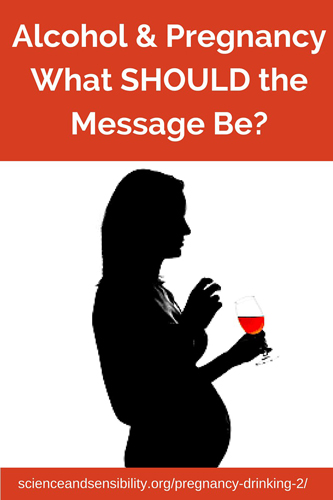Making Sense of Advice about Drinking During Pregnancy: Part Two - The Message
By: Sharon Muza, BS, LCCE, FACCE, CD/BDT(DONA), CLE | 0 Comments
By Elizabeth Mitchell Armstrong, Ph.D., M.P.A.
 As a follow up to the intense attention the recent announcement the CDC made last month on alcohol and women of childbearing age, Elizabeth Mitchell Armstrong, a researcher and expert on the topic of drinking and pregnancy shared information on the causes of Fetal Alcohol Syndrome and what we know about the effects of alcohol consumption during pregnancy in Part One of our series on this topic. Today, Dr. Armstrong discusses what message should be going out to women of reproductive age on the topic of drinking during pregnancy and what childbirth educators and others should know about providing women and families information to allow them to determine what feels comfortable to them. - Sharon Muza, Community Manager, Science & Sensibility.
As a follow up to the intense attention the recent announcement the CDC made last month on alcohol and women of childbearing age, Elizabeth Mitchell Armstrong, a researcher and expert on the topic of drinking and pregnancy shared information on the causes of Fetal Alcohol Syndrome and what we know about the effects of alcohol consumption during pregnancy in Part One of our series on this topic. Today, Dr. Armstrong discusses what message should be going out to women of reproductive age on the topic of drinking during pregnancy and what childbirth educators and others should know about providing women and families information to allow them to determine what feels comfortable to them. - Sharon Muza, Community Manager, Science & Sensibility.
What then should the message about drinking during pregnancy be? Based on the evidence, should we tell all women to abstain completely from alcohol when pregnant or potentially pregnant? Before we answer these questions, it is worth establishing a few precepts to guide decision-making. In addition, we should consider the consequences of broad-based and absolute warnings like the one the CDC recently issued; are such warnings even effective?
First, we ought to focus on evidence-based recommendations for women. Evidence, not fear, not superstition, not moral beliefs, should inform and guide public health recommendations. Second, we should remember that almost all women are highly motivated to protect the developing fetus-indeed, in our society we observe women going to great lengths to have safe and healthy pregnancies (Lyerly et al. 2007). In fact, most women reduce their alcohol consumption or stop drinking altogether during pregnancy (Armstrong, 2003). Third, we should be mindful of the fact that women today often experience pregnancy and birth in an atmosphere of fear and anxiety. It's easy to understand why pregnancy generates so much anxiety-women are deeply invested in giving birth to healthy children, but fearful that something, anything, everything they do or don't do during pregnancy will affect their future child. Indeed, women today, as in the past, are made to feel responsible for everything that happens before, during and after pregnancy and birth.
While it is true that we cannot say with certainty what level of alcohol exposure in pregnancy is safe, which leads people to the seemingly reasonable claim, "better safe than sorry," it does not necessarily follow that telling women not to drink at all is good public health policy. Let's unpack some of the consequences of this kind of admonition. First, by telling women that any amount of alcohol exposure, no matter how minimal, is dangerous we unnecessarily escalate the fear and anxiety that already plague the modern experience of pregnancy. It is probably not uncommon for women to drink occasionally before they realize they are pregnant-and fear about that potential exposure may overshadow women's initial joy about the pregnancy. Some women may even contemplate terminating a wanted pregnancy because they had a drink or two before realizing they were pregnant. For most women, this fear is completely unwarranted! Second, we run the risk of inducing message fatigue in women-when people are bombarded with endless health warnings they may disengage or disregard all of them-especially when such messages are not grounded in evidence. We saw this reaction in the backlash to the CDC's recent warning-which was widely criticized, parodied and pilloried on social media. Third, when dire warnings about the perils of alcohol consumption for all women like this recent one from the CDC are disseminated widely and diffusely, we do nothing to reach the women most at risk-those who already suffer alcoholism and who are unable to stop drinking based on moral exhortations alone. It is this small group of women who are truly at risk of adverse outcomes and who most need treatment and help. Universal strategies, whether in the form of warning labels or point-of-purchase signs or public health recommendations, are powerless to help anyone, pregnant or not, who suffers the disease of chronic alcoholism. Alcoholism is a devastating disease for those in its grip and for everyone around them; it takes an enormous toll on women's own health and wellbeing. Women who struggle to control their drinking may be unprepared for pregnancy and parenting in all kinds of ways. Women who cannot control their drinking and in particular, women who binge drink, may face increased risk for fetal alcohol syndrome or alcohol-affected births. As the CDC points out in its bulletin, doctors should screen all women carefully for evidence of alcohol abuse-and should refer women to appropriate care (CDC 2016b). This is sound advice. Even in the absence of any risk of teratogenic effect of alcohol, we would want to give women with drinking problems extra care, attention and counseling during pregnancy precisely because problem drinking threatens the woman's own health-and she, after all, is the patient. Moreover, we know that maternal health and wellbeing are the best guarantors of fetal health and wellbeing. Healthy women have healthy babies, for the most part. Finally, it is not just the teratogenic potential of alcohol that ought to trigger a heightened level of care for women who struggle to manage their drinking; heavy drinking threatens the health of future mothers and their future children in multiple ways. A woman who abuses alcohol before and during pregnancy is also at risk of compromised parenting after her child is born. We need a better definition of what kind of drinking actually is a problem in pregnancy. It's not that problem drinking shouldn't raise red flags-it's how we interpret and respond to those flags that matters.
I want to end by reflecting on two aspects of this latest warning from the CDC. First, it encapsulates the increasingly fear-based approach that characterizes the experience of pregnancy today. Pregnancy and childbirth have always been awesome, awe-inspiring and inherently uncertain experiences. Consider the irony of a world in which reproduction is safer than ever, but women and their partners are ever more worried and anxious about pregnancy and birth. Endless warnings broadcast to all women regardless of actual risk form a dark and ominous cloud overshadowing the radiant joy of pregnancy and anticipation of the arrival of a child. This latest CDC warning reflects the increasingly fear-based approach to managing the uncertainty of pregnancy; it's a flashback to the idea that women could unwittingly harm their unborn children. Second, the CDC warning frames all women as potentially pregnant or "pre-pregnant" all the time. In this, the warning reflects the move to embrace the idea of "pre-conception health," an initiative that the CDC first launched in 2004. While some aspects of the preconception health initiative are laudatory-especially the push to encourage women to plan their pregnancies and to prepare for pregnancy by optimizing their own health, other seem to take us backwards in time, to a view of women as primarily reproductive vessels. Every time we impose-without evidence- another prohibition on pregnant women-or women who may someday be pregnant-we ratchet up the social pressure on women to be perfect, self-sacrificing mothers and we constrain the ability of women to live fully realized lives (Waggoner, 2013). This is a not an argument for selfishness or wild abandon. It's a plea to weigh carefully the evidence base for and the consequences of public health messages. It's also an argument for accepting that we cannot control, manage, or erase every risk in pregnancy, no more so than in life. The same logic that animates advice to avoid alcohol entirely during pregnancy-or even during "pre-pregnancy" (aka the better part of a woman's life span!), might just as well dictate that pregnant women should not cross the street, walk down the sidewalk, take a yoga class, drive to the grocery store, provide hands-on care to young children or the elderly or anyone who is sick, -each of these activities poses some risk to the fetus-indeed, some, like driving or riding in a car, pose much greater risk of bodily harm. Yet we commonly understand that pregnant women, like the rest of us, regularly make all kinds of risk assessments. Some women will decide to avoid alcohol entirely while they are pregnant. Some women will feel comfortable drinking occasionally-and they should feel reassured that there is no evidence that drinking moderately poses any risk of adverse outcome. Women deserve evidence-based information, not shaming and blaming, to guide their choices before, during and after pregnancy.
References
Abel, E.L. (1993). Fetal alcohol syndrome and fetal alcohol effects. New York: Plenum Press.
Armstrong, E.M. (2003). Conceiving risk, bearing responsibility: Fetal alcohol syndrome and the diagnosis of moral disorder. Baltimore, MD: Johns Hopkins University Press.
Centers for Disease Control and Prevention. (2016a, February 2). More than 3 million US women at risk for alcohol-exposed pregnancy: Press release. Retrieved from http://www.cdc.gov/media/releases/2016/p0202-alcohol-exposed-pregnancy.html
Centers for Disease Control and Prevention. (2016b, February 2). Alcohol and pregnancy: Why take the risk? Vital Signs. Retrieved from http://www.cdc.gov/vitalsigns/fasd/index.html
Gray, R. & Henderson, J. (2006). Review of the fetal effects of prenatal alcohol exposure. Report to the Department of Health. Oxford, UK: National Perinatal Epidemiology Unit.
Henderson, J., Kesmodel, U. & Gray, R. (2007). Systematic review of the fetal effects of prenatal binge drinking. Journal of Epidemiology and Community Health, 61, 1069-1073.
Kukla, R. (2016, February 10). Should all women not on birth control give up drinking? The Los Angeles Times. Retrieved from http://www.latimes.com/opinion/op-ed/la-oe-0210-kukla-cdc-alcohol-pregnancy-20160210-story.html
Macmillen, H. (2016, February 9). This guy redid the CDC's guidelines for women's alcohol use to address men. Retrieved from http://www.refinery29.com/2016/02/102866/cdc-alcohol-guidelines-for-men
Lyerly, A.D., Mitchell, L.M., Armstrong, E.M., Harris, L.H., Kukla, R., Kuppermann, M. & Little, M.O. (2007). Risks, values and decision making surrounding pregnancy. Obstetrics and Gynecology, 109,979-984.
Petri, A. (2016, February 3). The CDC's incredibly condescending warning to young women. The Washington Post. Retrieved from https://www.washingtonpost.com/blogs/compost/wp/2016/02/03/the-cdcs-incredibly-condescending-warning-to-young-women/?postshare=6811454559325066&tid=ss_tw
Skenazy, L. (2016, February 4). Uncle Sam's 'don't drink' edict for American women is idiotic. The New York Post. Retrieved from http://nypost.com/2016/02/04/uncle-sams-dont-drink-edict-for-american-women-is-idiotic/
Stratton, K., Howe, C., & Battaglia, F. (Eds.). (1996). Fetal alcohol syndrome: Diagnosis, Epidemiology, Prevention and Treatment. Washington, DC: National Academy Press.
Waggoner, M. (2013). Motherhood preconceived: the emergence of the preconception health and health care initiative. Journal of Health Politics, Policy and Law, 38, 345-372.
About Elizabeth Mitchell Armstrong, Ph.D., M.P.A
 |
| © Betsy Armstrong |
Elizabeth Mitchell Armstrong, Ph.D., M.P.A., is Associate Professor of Sociology and Public Affairs at Princeton University. She studies the history and sociology of medicine, particularly pregnancy and childbirth, public health, and medical ethics. She is the author ofConceiving Risk, Bearing Responsibility: Fetal Alcohol Syndrome and the Diagnosis of Moral Disorder (Johns Hopkins University Press, 2003), the first book to explore fetal alcohol syndrome from a sociocultural perspective and to challenge conventional wisdom about drinking during pregnancy. She has also published on mass media attention to disease, family planning, medical mistakes, adolescent motherhood, prenatal substance use, home birth, and the sociology of pregnancy and birth. She is a past member of the Board of Directors of Lamaze International and she currently serves on the Lamaze International Certification Council. She is the mother of two.
Published: March 17, 2016
Tags
Childbirth educationNewbornResearchCDCBabiesEvidence Based MedicineNews About PregnancyInfant AttachmentFASFetal Alcohol Spectrum DisordersElizabeth Mitchell Armstrong